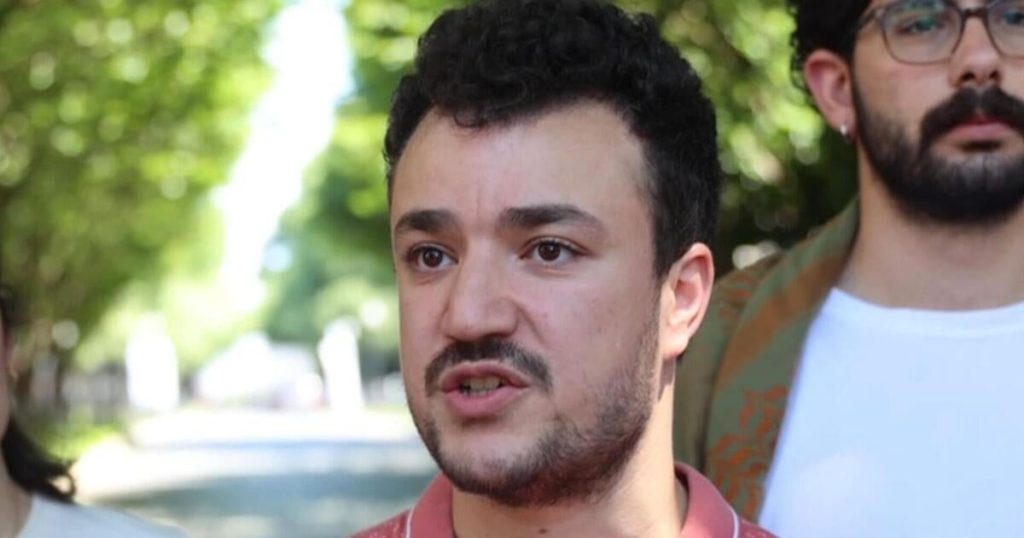A pro-Palestinian activist, Mahmoud Khalil, is currently entangled in legal battles against federal authorities who seek to deport him following his involvement in protests at Columbia University. His arrest over the weekend, executed by immigration officials, has sparked national attention and raised concerns regarding academic freedom and the rights to free speech. As Khalil, a recent graduate, awaits a crucial court hearing, advocates and university officials voice their discontent over what they perceive as an infringement on lawful dissent.
| Article Subheadings |
|---|
| 1) Recent Developments in Khalil’s Legal Battle |
| 2) The Context of Khalil’s Arrest |
| 3) Government Stance on Deportation |
| 4) Reactions from Columbia University Community |
| 5) Implications for Free Speech and Academic Freedom |
Recent Developments in Khalil’s Legal Battle
On Monday, a federal judge intervened by temporarily halting the deportation of Mahmoud Khalil. His case is now poised for a hearing that is crucial not only for his future but also for broader discussions regarding the treatment of activists in the United States. Khalil, who had been detained at a facility in Jena, Louisiana, finds himself facing opposition from federal authorities after authorities allegedly received a directive from the State Department to revoke his visa and green card. Although he will not be present at the hearing in New York, the outcome will significantly impact his life and has already cast a shadow over the university community.
The Context of Khalil’s Arrest
Khalil’s arrest on Saturday occurred in the backdrop of heightened tensions surrounding protests related to the ongoing conflict between Israel and Hamas. As a recent graduate with a master’s degree in International and Public Affairs from Columbia University, Khalil’s activism has drawn considerable attention. He has been a vocal advocate for Palestinian rights and has been involved in organizing events that express solidarity with Palestinian civilians. His legal troubles began when he allegedly distributed flyers promoting pro-Palestinian viewpoints, which the government has characterized as support for terrorist activities. However, Khalil’s attorneys assert that he is merely being punished for exercising rights protected under the First Amendment.
Government Stance on Deportation
The government stance on Khalil’s deportation is visibly aggressive, with officials labeling him as someone who has aligned himself with terrorism. Karoline Leavitt, a spokesperson for the White House, remarked that Khalil misused the privilege of studying in the United States by “siding with terrorists.” This sentiment was echoed by various officials who have publicly stated intentions to revoke the visas of those perceived as terrorists. The government’s justification for such actions lies in an overarching policy aiming to deter any forms of dissent that officials believe threaten national security. This opens the door to broader implications regarding student activism and the expression of political beliefs on campus.
Reactions from Columbia University Community
In response to Khalil’s arrest, members of the Columbia University community have rallied to express their discontent and concern. Katrina Armstrong, the interim president of the university, acknowledged the complexities of the moment in her communication to the Columbia community. Describing the suspension of $400 million in federal funding due to alleged antisemitism on campus as a “challenging moment,” Armstrong urged the community to reflect on the core values of higher education. Protests have erupted following the arrest, with students and faculty members gathering to advocate for Khalil and defend the right to dissent. Their calls resonate with a belief that academic institutions ought to foster open dialogue and not stifle student expression.
Implications for Free Speech and Academic Freedom
The issues surrounding Mahmoud Khalil‘s case raise profound questions about free speech and its implications in academic settings. With the government’s stance on his activism viewed by many as an infringement on free speech rights, there is growing concern over how this may set a precedent for future cases involving student activism. Legal experts indicate that if Khalil’s deportation proceeds, it might discourage students from voicing unpopular opinions or engaging in activism that criticizes government policies. As public discourse around such protests intensifies, the risk of chilling effect on academic freedom becomes more pronounced, highlighting the need for universities to safeguard the right of students to express their beliefs without fear of legal repercussions.
| No. | Key Points |
|---|---|
| 1 | Mahmoud Khalil, a pro-Palestinian activist, is fighting deportation after his arrest at Columbia University. |
| 2 | A federal judge temporarily halted Khalil’s deportation ahead of a scheduled hearing. |
| 3 | The arrest occurred amid increased tensions surrounding protests about the Israel-Hamas conflict. |
| 4 | Columbia University officials and students have expressed concerns over the implications for free speech. |
| 5 | The case highlights potential chilling effects on academic freedom and student activism. |
Summary
The legal struggle facing Mahmoud Khalil represents a crucial juncture in the discourse surrounding free speech, academic freedom, and government intervention in dissent. As his case unfolds, it draws the attention of activists, legal experts, and academic institutions alike. The reverberations of Khalil’s potential deportation could have lasting effects on the rights of students to express their views and engage in political activism on campus.
Frequently Asked Questions
Question: What led to Mahmoud Khalil’s arrest?
Mahmoud Khalil was arrested based on allegations from the federal government that he supported terrorist activities by organizing pro-Palestinian protests and distributing related flyers at Columbia University.
Question: How has the government justified the deportation efforts against Khalil?
Officials claim that Khalil misused his student visa by siding with terrorist organizations, stating a zero-tolerance policy towards any perceived support of terrorism.
Question: What is the stance of Columbia University regarding Khalil’s situation?
Columbia University officials have expressed concern over the implications of Khalil’s arrest for free speech and academic freedom, with protests erupting among students and faculty advocating for his rights.



